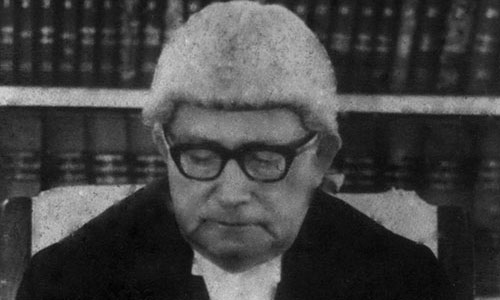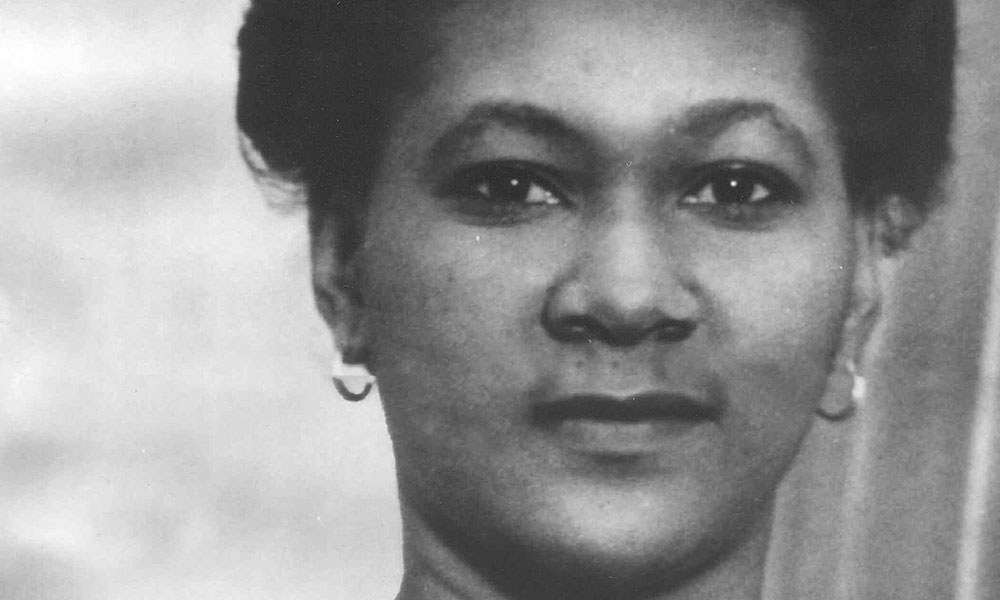
Maurice Herbert Davis was born on the 30th April 1911 to Louisa Richards of Old Road. His father was Claude Mortimer Davis, an engineer. As a boy he attended the Basseterre Boys’ School and graduated with a Seventh Standard Certificate. At the age of fifteen he started serving as a pupil teacher at Trinity Government School. Later he became a junior civil servant and worked in the Court Registry where he first made acquaintance with a career in which he was to enjoy admirable success. During the 1937 elections, the first in sixty years, Davis assisted E. A. Evelyn, the Returning Officer in Basseterre and was actually the first person to vote in that constituency.
In 1941 Davis went to England to study law. He was admitted as a student by the Honourable Society of the Inner Temple in London. In the space of eighteen months he passed his Bar finals examinations and was called to the English Bar. He returned to the Caribbean in 1943 and was called to the Bar in Antigua, then the seat of the Presidency of the Leeward Islands which included St. Kitts Nevis and Anguilla. It was also during that same year that he married Sylvia Kathleen Kelsick
On his return, Davis quickly became one of the leading lawyers of St. Kitts, Nevis and Anguilla. He excelled in the practice of criminal law but his clients came from all walks of life. His work in court was described as a magnificent performance and observers noted his incisive cutting approach to his cases, his devastating cross-examination, and his hypnotic effect on juries. Davis could suggest credible scenarios that, at times won him cases. Such was his defence of “Mango Jean” who was charged with the murder of “Tourist”. Popular belief said that “Tourist” had been sunk with ballast to the bottom of the sea but the body had not been recovered. Davis set before the jury the possibility that one day “Tourist” might reappear but by then his client would have been executed. “Mango Jean” was acquitted.
There were days however when Davis’ flamboyance did not work. In 1960 he represented nine men from St. Paul’s who worked on Belmont estate and who were accused of throwing missiles at Barbadian workers. He withdrew from this case because the Barbadian Magistrate would not dismiss himself from it and he felt his clients were not going to be fairly treated. The matter was adjourned on that occasion. When it came up again before the same Magistrate, Davis showed up late and declared that he was still on the case. The Magistrate, who had already started to hear the witnesses, reminded him of his earlier withdrawal and Davis could do nothing but withdraw a second time. Eight of the nine men were found guilty.
In 1944, following the death of Joseph Matthew Sebastian, Maurice Davis served as an elected member of the Legislative Council, representing the St. Kitts Workers’ League. He was also a member of the Federal Legislative Council. Together with Joseph France and Robert Bradshaw, he had to function within the limitations imposed on the elected members by the Committee System. At the time, elected members chaired advisory committees composed mainly of English heads of departments. The elected members found that their autonomy and influence was severely limited. As a compromise, Governor Blackburne recommended the introduction of the quasi-ministerial Membership System in St. Kitts, Nevis and Anguilla. Davis served as the Member for Communications and Works. Meanwhile relations with the other representatives of the League started to deteriorate .
In 1954 the Colonial Office expressed concern that the men who were likely to serve as Ministers were also Union leaders and wanted them to chose which role they would perform. Governor Blackburne feared that the employers and intelligentsia would “try to drive a wedge between parties and unions” in the islands throwing society back into industrial anarchy. It was Davis who argued that the electorate had returned Union leaders in the 1952 election and that the electorate should decide the matter again in the following election..
During this period, Davis was appointed in turn legal advisor and chairperson of the Central Housing Corporation which was then engaged in the eradication of trash houses and slums in St. Kitts. It was also during this period that Davis, who formed part of a legal team lead by Sir Courtenay Hannays, represented the Government in the case concerning the acquisition of Frigate Bay. He also served as a member of the Law Library Committee, the Labour Welfare Fund Committee and represented St. Kitts in the discussions that were taking place in London concerning a federation of the West Indies.
The issue of a new sugar factory in Nevis widened the breach in relations between Davis and Bradshaw. The project had been deemed uneconomic in a study conducted by the Colonial Office. Davis was uncompromising in his objection too it. The majority of the Executive Council including the member for Nevis advised against it. Bradshaw was the only dissenting vote.. On the 1st May 1955, the first Labour Day celebrated in St. Kitts Bradshaw openly attacked Davis. At a legislative council meeting he later called for an inquiry into the operations of public works which resulted in his replacement by Southwell. This change marked the final break between the coloured middle class, which had launched the movement, and the new leadership of the League.
The full Ministerial System of Government was introduced in 1956, and France, Bradshaw and Southwell were the first ministers. By the following year Maurice Davis had disappeared from the labour platform. His co-operation with Labour came to an end when he found himself disagreeing strongly with the Party’s policies. A clash of personalities and questions about the intellectual capabilities of the other labour candidates seem to have played a role in Davis decision to change political allegiances. Lee Moore was later to describe him as “an aristocratic democrat or a democratic aristocrat”. Educated and outspoken Davis, often found it difficult to toe the line within the party.
In 1960 he faced the electorate as the leader of the People’s Progressive Movement. He was joined by other disappointed Labour supporters such as Guston Lewis and Edrick Liburd. From that platform, Davis claimed that he had run for election in 1944 because, at the time, nobody else would. He also criticised the “fanfare and trumpet blowing” over the acquisition of Frigate Bay by the Government. He pointed out that the earlier acquisition of Bayfords had also been accompanied by promises and hopes that had not materialised because of lack of proper planning. Planning for the future became the theme of his campaign.
The PPM was not the only party opposing Labour. The Democratic Party, later the People’s Action Movement, strongly supported by the planter class was gradually gaining momentum. However, unlike some of the others who had joined him in the PPM, Davis did not allow his disagreements with the Labour Party to push him into the fold of PAM. Before long he was again working with the Labour Government. In 1970, he was asked to chair the committee for the Christena Disaster Fund.
In 1975, Maurice Davis was appointed Chief Justice in the Eastern Caribbean Supreme Court. His candidature was championed by Premier Robert Bradshaw and received the consent of all the premiers in the Associated States. Her Majesty conferred on him the title of Knight Batchelor. During his first meeting with his judicial brothers of the Court of Appeal, Sir Maurice announced that his sign was Taurus and that they should govern themselves accordingly. In the court room, his judgements were characterised by brevity and simplicity. Within the fraternity, he made the salary and conditions of employment of judges a cause and he campaigned and obtained improvements in their favour.
When on the 21st April 1975, he came to St. Kitts in his new capacity, it was to hear the appeal by the Government against the Judgement in the Sugar Land Acquisition Case of the previous year. His decision favoured the Government and the owners opted to take the matter to the Privy Council.
In 1983, following his retirement from the Bench, Sir Maurice accepted the Labour Party’s invitation to serve on the Electoral Commission. He later tendered his resignation, claiming with total frankness and to the disappointment of the party that had nominated him, that his membership was, to him, a waste of time.
Sir Maurice died on 23rd October 1988 following a prolonged illness. He was survived by his wife, the Lady Kathleen, their son and five daughter and their families.




